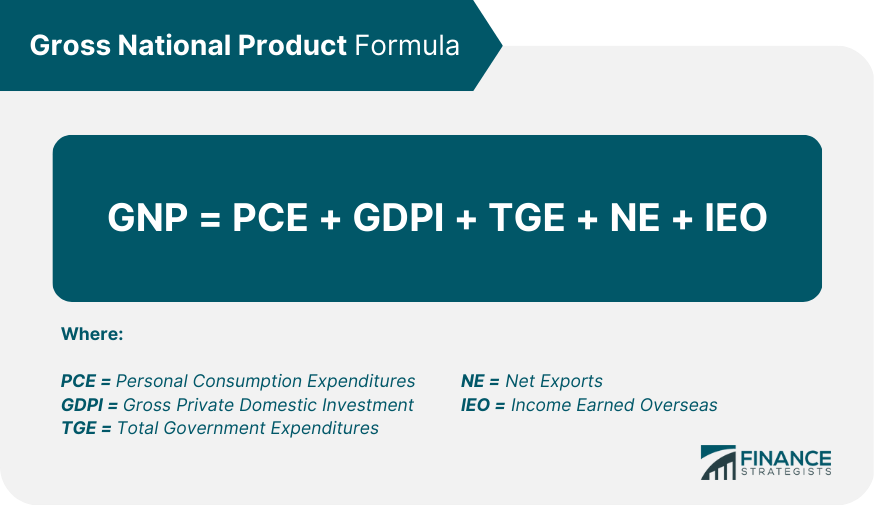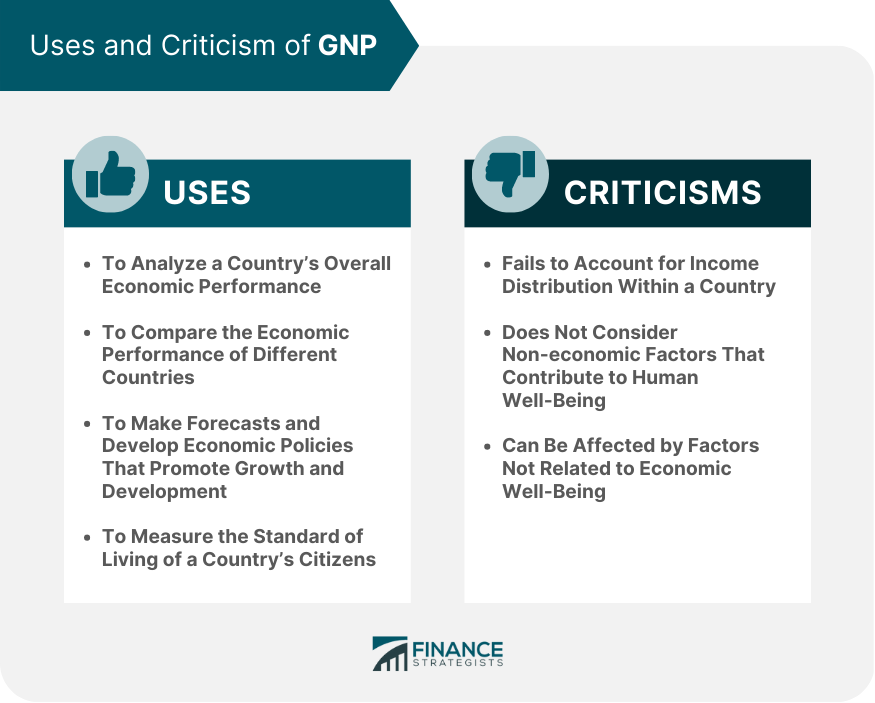Gross National Product (GNP) is a significant macroeconomic indicator that reflects a country's economic performance. It measures the total value of goods and services produced by a country's citizens and companies, regardless of their location. This comprehensive measure provides insights into a country's economic health and allows for comparisons between different countries' economic outputs. GNP takes into account the income earned by a country's citizens and companies from investments or works done abroad, whereas Gross Domestic Product (GDP) does not. It is widely used by economists, policymakers, investors, and financial analysts to analyze the overall health of a country's economy. GNP is a useful tool for comparing the economic performance of multiple countries or analyzing a single country's economic performance over time. The importance of GNP stems from its ability to provide a comprehensive view of a country's economic output and to identify trends and patterns in economic growth. By measuring the output of goods and services produced by a country's citizens and companies, GNP can be used to evaluate a country's living standard. The calculation of GNP involves adding up all the final goods and services produced by the citizens and businesses of a country in a given period, regardless of where they are produced. It includes the value of goods and services produced by citizens and companies within the country's borders and those produced by its citizens and companies abroad. The formula for calculating GNP is: GNP = PCE + GDPI + TGE + NE + ICE Where: PCE = Personal Consumption Expenditures GDPI = Gross Private Domestic Investment TGE = Total Government Expenditures NE = Net Exports IEO = Income Earned Overseas It is worth noting that GNP differs from GDP in that it also includes net foreign income. This means that GNP takes into account the income earned by a country's citizens and companies from investments or work done abroad, whereas GDP does not. Therefore, GNP is a more comprehensive measure of a country's economic output than GDP. The three main components of GNP are consumption, investment, and government spending. Consumption refers to household spending on goods and services, such as food, clothing, and housing. Investment includes spending by businesses on capital goods, such as machinery, equipment, and buildings, as well as on research and development. Government spending comprises the expenditure by the government on goods and services, such as education, healthcare, and infrastructure. Consumption is the largest component of GNP, accounting for more than two-thirds of the total. This is because households are the largest consumers in any economy. Investment accounts for around 15-20% of GNP, while government spending accounts for about 20-25%. The net exports component, the difference between a country's exports and imports, can be positive or negative, depending on whether the country is a net exporter or importer. GNP is widely used by economists, policymakers, investors, and financial analysts to analyze a country's overall economic performance. One of the most common uses of GNP is to compare the economic performance of different countries. By calculating the GNP of two or more countries, it is possible to compare their economic output and predict future economic trends. GNP can also be used to analyze the economic performance of a single country over time. By comparing the GNP of a country in different periods, it is possible to identify trends and patterns in its economic growth. This information can then be used to make forecasts and develop economic policies that aim to promote growth and development. Another important use of GNP is to measure the standard of living of a country's citizens. While GNP is not a perfect measure of the standard of living, it is a useful indicator of the overall economic health of a nation. A high GNP per capita indicates a relatively high standard of living, while a low GNP per capita suggests a lower standard of living. Despite its widespread use, GNP has some significant limitations as a measure of economic performance. One of the most significant criticisms of GNP is that it needs to consider income distribution within a country. This means that a country with a high GNP may still have significant poverty and inequality. Another criticism of GNP is that it does not account for non-economic factors contributing to human well-being. For example, GNP does not take into account factors such as education, health, and environmental sustainability. This is particularly relevant for developing countries, where economic growth may not necessarily lead to improvements in human well-being. In addition, GNP can be affected by factors that are not related to economic well-being. For example, a natural disaster or war may lead to an increase in GNP due to the need for rebuilding, even though these events have a negative impact on the well-being of the affected population. In response to these criticisms, there have been several attempts to develop alternative measures of economic performance. One of the most well-known is the Human Development Index (HDI), developed by the United Nations Development Programme (UNDP) in 1990. The HDI takes into account factors such as life expectancy, education, and income, providing a more comprehensive measure of human well-being than GNP. Another alternative to GNP is the Genuine Progress Indicator (GPI), which was developed by Redefining Progress, a non-profit research organization based in the United States. The GPI takes into account economic factors such as consumption and investment, as well as non-economic factors such as volunteer work and environmental sustainability. Gross National Product is an essential macroeconomic indicator that measures the total economic output of a country. It is widely used by economists, policymakers, investors, and financial analysts to assess the overall health of a country's economy. However, GNP has some limitations, particularly its failure to account for non-economic factors contributing to human well-being. To overcome these limitations and make informed financial decisions, it is essential to seek the advice of a professional specializing in wealth management. An expert financial advisor can offer guidance and assist individuals and businesses in navigating the intricate landscape of macroeconomic indicators, such as GNP. Individuals and businesses can develop effective investment strategies, manage their wealth, and achieve their financial goals by working with a financial advisor. What Is Gross National Product (GNP)?
GNP Calculation

GNP Components
Uses of GNP
Criticisms of GNP

Alternatives to GNP
Conclusion
Gross National Product (GNP) FAQs
Gross National Product (GNP) is a macroeconomic indicator that measures the total economic output of a country, including the value of goods and services produced by its citizens and companies abroad.
GNP is calculated by adding up the final value of all goods and services produced by a country's citizens and companies, regardless of where they are produced. The formula for calculating GNP is GNP = C + I + G + NX.
The components of GNP are consumption, investment, government spending, and net exports. Consumption accounts for the largest share of GNP, followed by government spending, investment, and net exports.
GNP has been criticized for failing to account for non-economic factors that contribute to human well-being, such as education, health, and environmental sustainability. It also does not consider the income distribution within a country, which can lead to significant poverty and inequality.
Alternatives to GNP include measures such as the Human Development Index (HDI) and the Genuine Progress Indicator (GPI), which consider factors such as life expectancy, education, income, volunteer work, and environmental factors sustainability. These measures provide a more comprehensive view of a country's economic and social well-being.
True Tamplin is a published author, public speaker, CEO of UpDigital, and founder of Finance Strategists.
True is a Certified Educator in Personal Finance (CEPF®), author of The Handy Financial Ratios Guide, a member of the Society for Advancing Business Editing and Writing, contributes to his financial education site, Finance Strategists, and has spoken to various financial communities such as the CFA Institute, as well as university students like his Alma mater, Biola University, where he received a bachelor of science in business and data analytics.
To learn more about True, visit his personal website or view his author profiles on Amazon, Nasdaq and Forbes.















